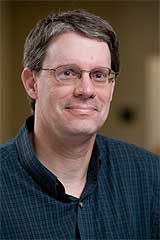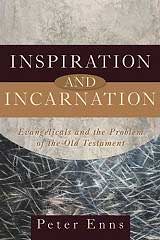My Old Testament colleague at Taylor Seminary, Dr. Jerry Shepherd, wrote the following post for the Canadian Evangelical Theological Association email list. It is reproduced here with his permission.
I want to comment just a bit on the Peter Enns situation. There was a thread on the Canadian Evangelical Theological Association email list a few months ago with regard to the Enns situation where I made a couple of contributions, but here are some more thoughts in light of Enns’s suspension. Keep in mind that I am writing this as both a Westminster Theolgical Seminary (WTS) alum and one who was very much involved in the OT department when I was there. I was Al Groves’s TA for a number of years, taught a few courses myself, and was involved with the Westminster Hebrew Computer Project. I took numerous courses both at the Masters and PhD levels from Al Groves, Ray Dillard, Tremper Longman, and Bruce Waltke. Doug Green, Peter Enns, and Mike Kelly were my classmates.
While there are some things in Enns’s Inspiration & Incarnation that I might disagree with, and some things I might have worded differently, I believe the book is entirely within both Evangelical orthodoxy more broadly, and Reformed orthodoxy more narrowly. WTS is a confessional school, and I understand the need to continue to uphold the school’s commitment to the Westminster Confession of Faith (WCF). But there is also needed the continuing commitment to the idea of “Reformed, yet reforming.” To make the WCF the major evaluative tool by which exegetical statements are to judged orthodox or not, especially when the WCF itself needs to be exegeted through a particular set of lenses to arrive at this judgment, is, in my opinion, very much misguided.
There is nothing in Enns’s book that is not in a trajectory with the teaching I received from the OT department at Westminster in the 80s and early 90s, and I mean the entire department: Dillard, Longman, Waltke, and Groves. For the Board to make this kind of decision with regard to Enns is also at the same time, in my opinion, a judgment on the entirety of the current OT dept., as well as a retroactive judgment on nearly three decades of OT instruction at WTS, especially since two of the endorsers on the back cover of the book are Longman and Waltke. Additionally, the decision appears to be one that is being made by persons who are simply unaware of the complexities involved in the faithful critical discipline of OT studies in the context of the ancient Near East.
As far as the faculty who are opposed to Enns, I am grieved because, apparently, at least a couple of the professors in that camp are ones for whom I have great admiration, respect, and gratitude for what they taught me (there are others with whom I am not personally acquainted).
One last comment. For my OT intro class last Fall, I had my students read I&I and write a reaction paper to it. With only a couple of exceptions (in a class of about 25), the students found the book to be very helpful. To my knowledge, none of these students have lost their faith. To the contrary, a couple of the students who work with university and college students on secular campuses have found the book to be a valuable resource for them in their work with these students.
I hope and pray that more informed thinking will prevail.
Blessings,
Jerry
Dr. Jerry E. Shepherd
Associate Professor of Old Testament
Acting Academic Vice President
Taylor Seminary, Edmonton, Canada



